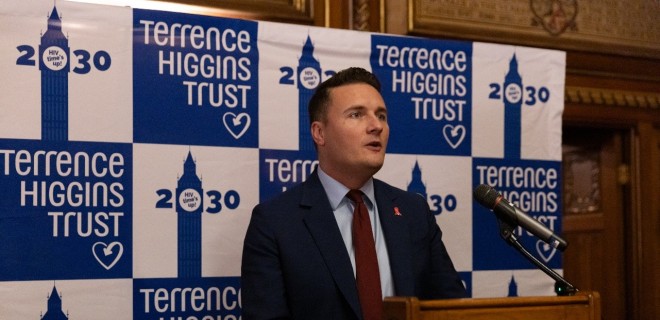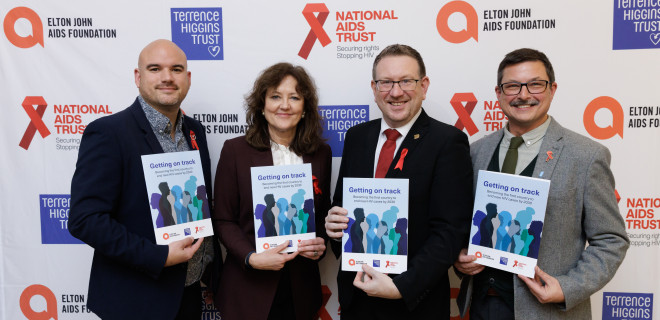At Prime Minister's Questions on Wednesday 13 September, Nicola Richards MP called on Rishi Sunak to expand opt-out HIV testing to all emergency departments (A&Es) in areas with a high HIV prevalence, including her constituency in the West Midlands.
Opt-out testing is when patients who come into A&E are routinely tested for HIV when having other blood tests unless they opt not to.
Speaking in the House of Commons, Nicola praised Government for its their work to make the UK the first in the world to end new cases of HIV by 2030. She heralded the nation’s 'world-leading' opt-out HIV testing as integral to achieving the goal by identifying people living with undiagnosed HIV so they can start treatment. The West Bromwich East MP told the House that 'we must roll out opt-out testing to other high prevalence areas' and asked Rishi Sunak to commit to meeting with herself and 'the incredible Terrence Higgins Trust' so he can learn more about the merits of opt-out testing.
The Prime Minister thanked Nicola for her campaigning in this area, before reaffirming the Government’s commitment to end new cases of HIV. He added: 'I’m pleased that she highlighted that the provisional data from NHS England indicates that the opt-out testing programme has been highly successful.' Adding the Department of Health and Social Care is currently evaluating the impact of the current programme 'with a view to deciding whether it should be expanded in additional areas' and confirming Ministers will keep the House of Commons updated on decisions.
Ending the HIV epidemic in this country would mean so much to so many, particularly the LGBTQ+ and Black African communities that have been so disproportionately affected. But to get there, we will have to find the 5150 undiagnosed people living with HIV in the UK – 4,400 in England – and get them on to treatment. Opt-out HIV testing is crucial to achieving this.
Funding for opt-out blood bourne virus testing in the very highest prevalence areas – London, Brighton, Manchester and Blackpool – was allocated as part of the Government’s HIV Action Plan in 2021. In just 16 months, over 1.2 million HIV tests have been carried out and more than 3,000 people have been found with HIV, hepatitis B and hepatitis C in London, Manchester, Brighton and Blackpool alone.

It’s taken a village to make this happen – pilots by Elton John AIDS Foundation, a recommendation by the HIV Commission we founded with EJAF and National AIDS Trust, and campaigning from HIV charities across the country. The team at NHS England have rolled opt-out testing out at incredible speed and it’s taken hundreds of healthcare staff to make the programme a reality.
In February, as a result of campaigning from MPs and council leaders across the country, Public Health Minister Neil O’Brien committed to consider funding for expanding opt-out HIV testing to the next 31 areas and 43 A&Es with a high HIV prevalence. We estimate that a further £23 million is needed to implement this for one year.
This pioneering approach to HIV testing is saving lives, saving money and relieving pressure on the NHS. In the first 100 days of the programme, NHS England estimated that £2.2 million spent led to £6 million saved in care costs because those diagnosed have been able to initiate treatment. At Croydon University Hospital, when they first start opt-out testing the average hospital stay for a newly diagnosed HIV patient was 34.9 days. After two years of opt-out, the average stay is just 2.4 days.
It’s also tackling health inequalities. People diagnosed in emergency departments through opt-out testing are more likely to be Black African, women or older people – those most likely to be diagnosed late. In the first opt-out testing pilots, 45% of people diagnosed with HIV were of Black African, Black Caribbean or Black ‘other’ ethnicity, more than twice as many as the nationwide average of 22%. A further 35% were women (normally 25%) and 10% aged 65 or over. This shows the clear role opt-out HIV testing will play in driving us all – regardless of gender, ethnicity, age or sexuality – towards ending new HIV cases by 2030.
Speaking after Prime Minister’s Questions, Nicola Richards, MP for West Bromwich East, said: 'I am grateful to the Prime Minister for confirming that we remain committed to ending new cases of HIV in this country by 2030. Thanks to the incredible work carried out by Terrence Higgins Trust, we already know that opt-out testing saves lives and saves money by preventing people from becoming seriously unwell. In fact, more than 3,000 people have been diagnosed with HIV, Hepatitis B and Hepatitis C in 16 months alone.
'It was just a few months ago that I met with West Midlands Mayor Andy Street and campaigners at a roundtable to discuss HIV in our region. There we heard of the tragic cases of people in their 30s being diagnosed with dementia as a result of HIV related illnesses. In 2023, this should not be happening. We have all the tools and the knowledge to stop the spread of HIV, we just have to get on and do it. Extending opt-out testing is the crucial first step on that journey.'
Richard Angell, Chief Executive at Terrence Higgins Trust, said: 'We’re very grateful to Nicola Richards MP for highlighting the remarkable success of opt-out HIV testing at Prime Minister’s Questions.
'The expansion of A&E HIV and hepatitis testing in constituencies like West Bromwich East is fundamental to reaching our life-changing goal of ending new HIV cases by 2030. In just 16 months, more than 3,000 people have been found with HIV, hepatitis B and hepatitis C in London, Manchester, Brighton and Blackpool alone. These results are above and beyond what anyone expected and have demonstrated an incredible return on investment. The Government’s own guidance says it should be happening in Birmingham, Coventry, Sandwell, Walsall and Wolverhampton and cities like them.
'Every day that passes, we miss opportunities to find more people with blood bourne viruses. They cannot afford for there to be further delay – the Government must fund opt-out HIV testing for high prevalence areas now.'



